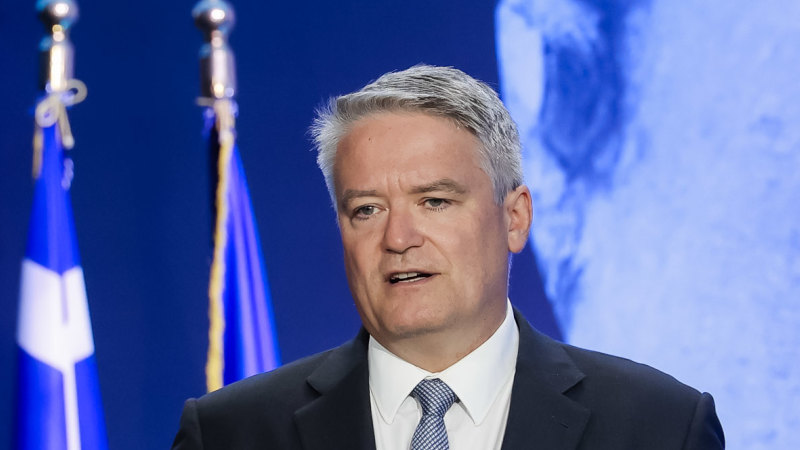Save articles for later
Add articles to your saved list and come back to them any time.
Delphi, Greece: The head of the OECD Mathias Cormann has told an international economic gathering that the West decoupling from China would be an expensive mistake and that the wrong lessons would have been learned from the pandemic.
Separating the US and China economies, also known as decoupling, was a policy pushed by China hawks in the Trump administration but under Democratic President Joe Biden has become more focused on diversifying supply lines for critical sectors, particularly technology.
OECD Secretary-General Mathias Cormann addressing the Delphi Economic Forum in Delphi.
Cormann, Australia’s former finance minister and now head of the Paris-based Organisation for Economic Co-operation and Development, said in a speech to the Delphi Economic Forum under way in the ancient city north-west of Athens, that while it is sensible to de-risk supply lines from being dependent on China, total decoupling by the West would leave the world poorer.
“Let’s learn the lessons of the pandemic and the impact of the war in Ukraine on global supply chains,” he said. “It is entirely sensible to focus on de-risking global supply chains but let’s not throw the baby out with the bathwater.
“Let’s avoid costly decoupling or deglobalisation, let’s keep in mind the significant benefits that come in terms of living standards and downward pressure on inflation with open global trade and investment.
“We need more effective global co-operation to ensure we can have a global rules-based trading system in good working order.”
Cormann said that the outlook for the global economy remained fragile with inflation too high and not coming down fast enough.
Headline inflation across the G20 countries, including Australia, is forecast to decline from 8.1 per cent to 5.9 per cent this year, still well above the central banks’ target inflation rate of 2 per cent.
Australia reported 7 per cent inflation this week. Treasurer Jim Chalmers said that while inflation had peaked, inflationary pressures remained.
Cormann said that central banks had “no choice but stay the course with their efforts to bring inflation back to target” through raising interest rates.
“And we are confident that they will do precisely that,” he said.
Face mask production at a factory in Shanghai. The pandemic exposed the world’s reliance on China for critical medical products and technology.Credit: Bloomberg
Cormann’s warning about avoiding complete decoupling from China follows remarks made by US Treasury Secretary Janet Yellen that the Biden administration does not want to decouple and that doing so would be “disastrous” for both China and the US.
But Yellen said that when it came to critical supply chains dominated by China as a result of unfair trade practices, the US would reinvest in domestic manufacturing as well as establishing networks based on political and economic allies, known as “friendshoring”. She said this was aimed at mitigating vulnerabilities that could lead to supply disruptions.
The United States’ deteriorating relationship with China – amid heightened tensions over Taiwan as well as the over-reliance on Russian gas exposed by Vladimir Putin’s invasion of Ukraine – has prompted soul-searching in Europe about the direction of its trade relationships.
European Commission President Ursula von der Leyen has called for the bloc to de-risk but not decouple its supply lines.
EU access to Australia’s rare earth minerals is likely to form a key part of any free trade deal that the EU and Australia strike, possibly this year after decades of stalled progress on negotiations.
Claudia Schmucker from the German Council on Foreign Relations also told the conference that with 80 per cent of economic growth outside Europe, the single market could not afford to be protectionist.
“My main recommendation would still be to keep an open trading system and do not start a fragmentation into friendshoring into political blocs because this will be dangerous for the European economy,” she said.
“Yes there are critical sectors, certain critical products that we need to diversify but we need to stay as open as possible because this is one of the reasons the European Union was so successful in the past.”
The reporter travelled to Delphi as a guest of the Delphi Economic Forum.
Get a note directly from our foreign correspondents on what’s making headlines around the world. Sign up for the weekly What in the World newsletter here.
Most Viewed in World
From our partners
Source: Read Full Article



